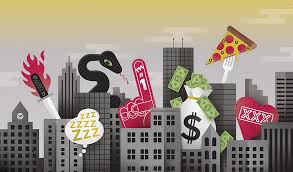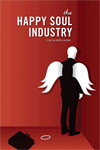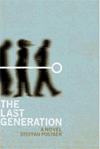This I cannot give up…
February 1, 2021

If we place instincts first…we will be pulled backward into disillusionment.
The line is from the Twelve & Twelve – a book Bill Wilson authored some twenty years after writing the Big Book of Alcoholics Anonymous. Cliff notes for the 12 Steps. He suggested recovering alcoholics begin removing their character defects lest they fall back into drinking. In keeping with the program’s Christian pedigree, defects were defined as the Seven Deadly Sins: Lust, Gluttony, Greed, Sloth, Wrath, Envy and Pride.
Lust wasn’t first on the list for nothing. Bill Wilson wrestled with his sexual appetites before and after getting sober and writing his manifesto. He adored his wife, revered her. But history suggests he liked the ladies, too. In the Big Book substantial text was devoted to prurient urges run amok. “Now about sex,” he wrote, “Many of us need an overhauling there.” You love AA was written by a man whose flaws did not go away after putting down the bottle.
Perhaps we shall be obliged in some cases still to say, “This I cannot give up yet…”
You’re not so depraved as to think this a loophole for misadventures. But you’re not willing to stop all of them either. You hadn’t been pulled backward into disillusionment. You were not bewildered by your actions. Yet. You were not dying inside. Yet. Nor were you drinking and using.
Yet.
The word clung. You didn’t need a sponsor to tell you how thin the ice was getting. You knew that you were playing a dangerous game, not only with your sobriety but with your family as well. In fact, you talked about it with your sponsor. Told him everything. He knew the primary reason you hadn’t stopped. You liked it too much.
Play Misty for Me (2)
July 29, 2020
Continued from previous…

This too shall pass your mother liked to say, even if she didn’t believe it. But she was right. Mist or fog, it evaporates. At times you embrace sadness, its depth and gravitas. But like an old friend he can overstay his welcome. Then you have to wait him out. Drag him along on your errands. Enduring his sourpuss and cynicism. Sometimes, you might ditch him on a hike. He couldn’t keep up in the gym either. If those things failed, you brought him to a meeting, tossing him center circle with everyone else’s shit.
Relief comes. And when it does you embrace it. Sing its song for as long as you can, feel your body electrified by it. Such joy is a blessing. And fleeting. A feminine spirit, she does as she pleases. An ephemeral pink cloud, you keep the window open for her.
You do miss the excitability of grandiosity. But ridding this was a fair price to pay for the leveling of valleys. Roller coasters are thrilling but no way to live. Soberly, you tread flat terrain.
But still…
There is the matter of your lesser addictions. Gluttony. Lust. It’s paradoxical, leaning in to them while turning away. You cannot resist the siren’s song.
More content coming soon!
Play Misty for Me
July 27, 2020

Everyone experiences situational depression. Conflict. Unresolved resentments. Sometimes it really is just the humidity. Having a bad day. You either accept the situation or change it. Regardless, it always ends. It is not clinical. Professional help and medicine are seldom required. What you are experiencing is neither clinical nor situational. Sadness descends upon you like mist. By no means pleasant it isn’t debilitating either. You can see through it. You can operate heavy machinery. You probably won’t drink over it.
Many people insist on finding a culprit for their misery: someone or something to blame. The world is filled with people making this mistake. One feels like shit because of a spouse, a boss, a relative, a neighbor, the President of the United States. You know better than to assign blame for melancholy. Yes. You’d like to make the blues situational. Then you could rectify the situation or be its victim. For years, you were the blindfolded child swinging madly for a target. Creating situations to meet your depression was understandable… and also idiotic.
You now have healthy ways to mitigate woe. AA taught. Others you picked up all by yourself. Be of service. Go for a run. Pray. Basically, do anything but wallow in it. You cannot think your way out of depression. If anything, thinking caused it. In the wild, animals do not get depressed because they do not sit around thinking. Food and shelter is their constant priority, their only priority. Put a bear in a zoo and it becomes depressed, anxiously pacing back and forth, sullen and surly. Domesticated, it turns neurotic.
Your mother was (and maybe still) clinically depressed. She has spent her whole life (and so yours) dealing with this problem. You read somewhere that far more women are clinically depressed than men. Maybe that’s because historically women have been domesticated more than men, anxiously pacing back and forth in their kitchens, sullen and surly in equal measures.
To be Continued.
The Man in Black
November 20, 2017

You are in the basement of a church, with twenty or so other people seated around an extended horizontal folding table. The usual cross-section, many have nothing in common except for a desire to stop drinking. A lot of them brought coffees from the neighborhood Starbucks. The meeting is nearly over.
Dallas is a thirty-something woman with black hair laced with purple. Wrapped around her left bicep is a tattoo of barbed wire. The tough exterior belies her fragility. Dallas is a newcomer, five long-ass days and longer nights under her belt. She is finishing her share.
“Now that I’m not drinking, my friends don’t want anything to do with me.” She looks around the room. “But what kind of friends are those, right?”
People nod. They’ve all had to say goodbye to their drinking buddies. It comes with the territory, this new life. Dallas continues.
“Anyway, they can go fuck themselves. My daughter’s the only other person that matters to me. I’m doing the deal. I’m doing it!” She taps the Big Book resolutely. “That’s all I got.”
‘Thank you, Dallas!’ the room chimes. It’s a good way to end the meeting. A newcomer with grit.
The first time you saw Dallas, at the loft, you didn’t think she’d get 24 hours. Yet, here she was. The secretary rings her bell then reads from the script:
“As there are only a few minutes left in the meeting it is now time to ask if anyone has a burning desire.”
No hands go up.
“Come on, people. This is the time and this is the place!”
A man raises his hand. His black shirt and pants contrast with his pale skin. He has on sunglasses, which if this weren’t AA might seem peculiar. But not here. The second part of the program’s name is Anonymous. He clears his throat.
“I have a burning desire.”
“Excellent!” The secretary responds. “The man in black has the floor!”
The joke garners a few chuckles from the group. Why not? It’s Friday. We are not a glum lot is a popular phrase from the Big Book.
The man in black reaches into the gym bag sitting in front of him and pulls out two liters of Dewar’s White Label. One at a time he places each bottle on the table.
“What I desire is for each you to have a drink.”
A gasp fills the room but the man in black pays it no mind. He begins arranging large sized Dixie cups into a neat row on the table. He opens a bottle and carefully begins pouring the scotch into a cup, then another. The smell permeates the room.
The secretary rises. Though stunned like everyone else, somebody has to do something. This is her meeting.
“Excuse me, sir,” she says. Her voice quavers. “Just what in the hell do you think you’re doing? This is a meeting of Alcoholics Anonymous.”
Raising an eyebrow, the man in black merely smiles. He could be tending bar.
“Well, I’ve already told you, Mam. I want you all to have a drink with me.” With that said, he slides a full cup to the woman sitting directly across from him. “Starting with you, sweetheart! You look like you could use a pop. I hope you like it neat.”
April, a frail creature no more than 18 years old, looks at the drink and the man with terror. She can’t speak. She is literally shaking.
“I…I…”
The man frowns. “What’s wrong, darling? Scotch not your drink of choice? Don’t worry, you’ll get used to it. I was the same way at your age.”
April whispers. “Please. If I have another drink I… I’ll… I’ll die.”
In the room, shock has turned to anger. A few men push their chairs back. Enough is enough. They rise.
Undaunted, the man in black continues looking directly at April. He casually pulls a large handgun from his bag and points it at her face. Inches separate the barrel from her nose.
Everyone freezes.
“No, no, no darling, you’ve got it all wrong.” He says, clucking at her, twitching the gun. “If you don’t have another drink then you’ll die.”
He looks at the standing men. With his free hand he indicates for them to sit. When they do he returns his attention to the young woman.
“Now drink up, darling. It’s damn near closing time.”
With a shaking hand, April lifts the cup to her mouth and sips. It is her first taste of alcohol in almost a year. She grimaces. The man cocks the gun.
“All of it.”
When she is finished she places the empty vessel down in front of her. Two tears collapse from her eyes, the mascara making them look like black rivulets. She sobs quietly.
“Like riding a bicycle, right?”
A couple chairs down from the gunman, an addict named Roberto can no longer hold his tongue. “Please, sir, I beg of you-
The man in black wheels around and points the gun at Roberto. His voice remains calm, sickeningly so.
“Don’t worry, Senor. There’s plenty to go around. Matter of fact, you can drink straight from the bottle. We don’t mind.”
He slides the jug of scotch to Roberto. It stops alongside of his Big Book.
“I…I… can’t drink this!”
Undeterred, the man in black counters. “Sure you can, amigo. Isn’t that what got you hear – drinking this?”
Roberto pleads. “But it’s been over eleven years!”
“Then you must be awful thirsty!”
Roberto stares at the bottle. He shuts his eyes. Prays? He reaches for the scotch but instead of picking it up he pushes it away, slowly, until it is just past his fingertips.
“I see,” says the man in black. “Well, how about we start you off with a shot?”
He pulls the trigger blowing a whole through Roberto’s chest. He’s dead before the blood exits his body, which it does suddenly and profusely.
“Any other requests?”
The man in black places the smoking gun on the table. He picks up one of the Dixie cups. “Cheers,” he says and downs it. “Who’s next?”
You have been sitting quietly, just a couple chairs down. You reach over and take one of the full cups of scotch. From the corner of your eye you see the man in black grinning, nodding.
“That’s right, son. If rape is inevitable you might as well enjoy it!”
He may have said that. Or you think he did. It doesn’t matter. A centimeter from your lips is alcohol! For years you’ve wondered if there was a backdoor, a way that would allow you to drink without regret. And here it is. Gunpoint! You lift the cup.
Your eyes they open. You are on your back. Breathing hard. You can smell blood and taste whiskey. But it’s so dark. And why are you in bed? Rainstorm and crickets from your iPhone. Oh. Okay. You’ve had a drinking dream. In the rooms they talk about these nightmares. They say upon awakening you are relieved none of it was real, that you are still sober. Yet “nightmare” isn’t the right word. Being able to drink with impunity. That part you liked.
The above is an excerpt from a book I’m writing, The Chaos Merchant.
Gods of Advertising is on hiatus so I may devote my full energy to personal writing as well as for clients. My services include copy writing, brand manifestos and creative business ideas: My portfolio
Do you have a writing project you’d like to discuss?
I look forward to hearing from you!
The Letter from the Editor which heads up the May issue of GQ has little to do with advertising but certainly qualifies as a nasty morsel of popular culture. It’s also quite sad. The magazine’s Editor-in-Chief, Jim Nelson was dining at the famed New Orleans’ restaurant, Stella this past Mardi Gras and happened to be in “wine spitting” distance of Nicolas Cage while he was in the midst of a notorious alcohol-induced blackout. Most of us are familiar with Cage’s meltdown, having heard the story here there and everywhere. Likely, we all attributed it to another “moment” in the controversial and bizarre star’s repertoire. Known for playing myriad odd, terrible and often wonderful characters (Raising Arizona, Vampire’s Kiss, Ghost Rider, Bad Lieutenant: Port of Call New Orleans, among many others), here he seemed to be channeling Charlie Sheen and then some.

“Leaving Las Vegas” no longer an act.
In any event, the GQ editor witnessed the entire debacle and elected to make it the subject of his forward to the magazine. Wise choice. As I said, it’s a scintillating piece.
But as I also said, it’s a sad one. But sadness is not the tone Nelson reported. Like most observers of popular culture, he took aim at the falling star and gave us a blow by blow. I don’t begrudge the writer for doing so. That’s his job. Sort of.
But there’s a crucial piece missing from the tawdry tale that might have actually provided real learning to the reader. In describing Cage’s condition, I intended the word “blackout” as noun more than adjective. Nicolas Cage was having an alcoholic blackout. In this condition the man no longer is cognizant, let alone in control. The symptoms were textbook. Yet, I’ll bet many of you are only aware of the obvious ones: lewdness, lechery and violence. Those lovely defects are what got Mr. Cage arrested, no small feat during Mardi Gras.
But what I found eerily fascinating were some of the other defects Cage manifested during his downward spiral. Nelson reports that the actor had befriended a couple at the bar and had insisted on buying them drinks. And not just any drinks but some of the most expensive wines on Stella’s impressive list. In recovery programs, they call this “grandiosity.” You say Cage is a millionaire movie star (actually, he’s bankrupt) but I’m telling you even garden variety drunks can and do display this defect. All of the time. It’s a marker for alcoholism.
Poignantly, prior to his arrest (just after breaking an interior window), Cage bellows to the embarrassed crowd: “You love me!” I say poignantly because now his grandiosity has degraded into self-pity and self-destruction. As Nelson pointed out in his article, chances are many of the patrons did, in fact, once love him, or at least got a kick out of him. But not anymore. Now they merely wanted him gone. Nicolas cage had hit a “bottom,” another recovery term that requires no defining. For Cage, that meant oblivion and a jail cell, not necessarily in that order.

Call it what it is: Alcoholism
Look, I don’t pretend to really care about Nicolas Cage or his personal demons. However, I do feel that every once in a while, when we’re given these all-too-similar stories about falling stars (Charlie Sheen, Lindsay Lohan, Courtney Love, etc…), that we are given the full story. It justifies none of their behavior but it might help someone else understand what’s going on or maybe even get better (themselves), if they’re sick, like Nicolas Cage clearly was and is. By not doing so, I feel the media (and society as a whole) is in as much denial about alcoholism and addiction at the pour souls they are covering.




 The Happy Soul Industry
The Happy Soul Industry The Last Generation
The Last Generation